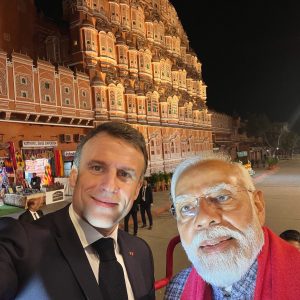French President Emmanuel Macron’s participation as the chief guest at India’s Republic Day celebrations on January 26 underscored not only mounting France-India bilateral cooperation, but also the significance of the Indo-French partnership in navigating the complex geopolitical landscape of the Indo-Pacific region.
Against the backdrop of China’s assertive behavior and expanding influence, India and France have been striving to strengthen their collaborative efforts, particularly in defense, renewable energy, and technology sectors.
During Macron’s visit to India, several significant agreements were reached between the two nations. First, India and France agreed to collaborate on joint production ventures for defense equipment, specifically mentioning helicopters and submarines for the Indian armed forces as well as for friendly nations. Additionally, a partnership was established for the maintenance, repair, and overhaul services of aviation propulsion engines in India, with a focus on Rafale engines and leading-edge aviation propulsion (LEAP) engines.
Furthermore, the Tata Group of India and Airbus of France inked an agreement for the joint manufacture of civilian helicopters, highlighting the commitment to bilateral industrial collaboration. In the aviation sector, CFM International secured an agreement with India’s Akasa Air for the purchase of over 300 LEAP-1B engines, strengthening ties between the two countries in aircraft engine manufacturing.
Beyond defense and aviation, both nations pledged to intensify cooperation in the southwest Indian Ocean, building on previous joint surveillance missions. Moreover, France announced initiatives to attract up to 30,000 Indian students annually for higher education, illustrating the broader scope of bilateral engagements beyond the defense and aerospace sectors.
However, there are challenges stemming from India and France’s differing approaches toward strategic autonomy, raising doubts about the sustainability of their partnership in the long run.
India’s foreign policy doctrine of non-alignment and sovereignty requires maintaining independence from formal alliances. This emphasizes its commitment to sovereign decision-making in international relations. In contrast, France adopts a pragmatic approach that involves a willingness to engage in opportunistic alliances to balance the influence of major powers in the Indo-Pacific region, such as the United States and China. This strategy allows France to pursue its strategic interests through flexible diplomatic engagements and multilateral partnerships to adapt to evolving geopolitical dynamics. This difference in approach poses a substantial challenge to aligning their goals effectively, particularly in the face of China’s growing assertiveness.
Despite these challenges, India and France have actively sought to enhance their collaboration in the Indo-Pacific region. The release of the India-France Indo-Pacific Roadmap in July 2023 during Prime Minister Narendra Modi’s visit to Paris marked a significant milestone in their partnership. This roadmap outlines a commitment to strengthen plurilateral arrangements with countries like Australia and the UAE, reflecting a concerted effort to confront shared concerns regarding China’s coercive activities in the region. Furthermore, the recent review of the roadmap during Macron’s visit to India signals a mutual intent to expedite efforts in implementing joint strategies to address evolving security challenges in the Indo-Pacific.
To navigate the complexities of Indo-French relations in the Indo-Pacific, both countries must strike a balance between their divergent approaches towards strategic autonomy. This entails fostering greater understanding and flexibility in accommodating each other’s strategic imperatives while pursuing objectives. India can uphold its commitment to strategic autonomy by leveraging its role as a leading regional power in the Indo-Pacific, while actively engaging with France and other like-minded partners in plurilateral arrangements to counter China’s assertiveness.
Effective coordination and cooperation between India and France are essential to overcome the challenges posed by their divergent approaches towards strategic autonomy. This entails regular dialogue and consultation at various levels, including diplomatic, security, military, and intelligence establishments, to synchronize their efforts and align their strategic objectives. Furthermore, leveraging existing cooperation mechanisms, such as the India-France Joint Working Group on counterterrorism, can facilitate greater convergence in addressing shared security concerns in the Indo-Pacific.
Despite differences in strategic autonomy approaches, India and France share significant areas of convergence in their Indo-Pacific strategy. Both countries prioritize maritime security, freedom of navigation, and a rule-based order in the region, reflecting a common commitment to upholding international norms and principles. By focusing on these objectives, India and France can overcome challenges posed by their divergent approaches and forge a more cohesive and effective partnership in countering China’s assertive behavior.
By leveraging their strengths and prioritizing shared objectives, India and France can navigate the complexities of Indo-Pacific geopolitics and contribute to fostering stability, security, and prosperity in the region.
To strengthen collaboration in the Indo-Pacific, India and France should focus on specific initiatives. High-level strategic dialogues are crucial for addressing regional security challenges and devising coordinated responses. Expanding defense cooperation through joint military exercises and knowledge-sharing is essential, as is strengthening maritime security through joint patrols and intelligence-sharing.
In addition to defense and maritime security, both countries should prioritize collaboration in renewable energy and technology partnerships. Promoting joint research ventures and investment in clean energy projects will bolster the Indo-French partnership. Exploring opportunities for bilateral trade and business partnerships in sectors like infrastructure development and the digital economy is also key for economic ties.
Active engagement in multilateral forums like the Quad and fostering cultural exchanges will further enhance collaboration. By undertaking these initiatives, India and France can effectively tackle shared challenges and contribute to regional stability and prosperity in the Indo-Pacific.
In conclusion, the Indo-French partnership in the Indo-Pacific region is a testament to the evolving dynamics of global geopolitics. While India and France hold differing approaches to strategic autonomy, these disparities pose both challenges and opportunities for deeper understanding and collaboration. Through ongoing dialogue, flexibility, and a shared commitment to common goals, India and France can navigate these differences, forging a resilient partnership. This collaborative effort has the potential to significantly contribute to fostering stability, security, and prosperity in the Indo-Pacific region amidst the shifting tides of international relations.
































